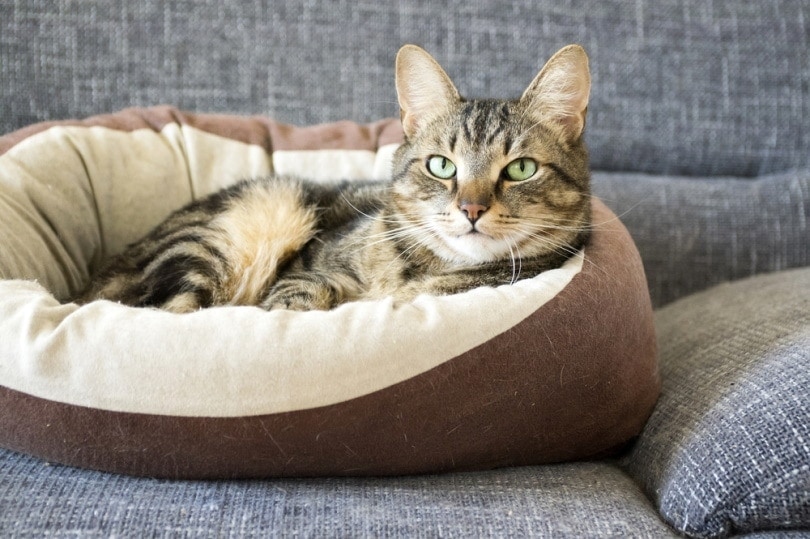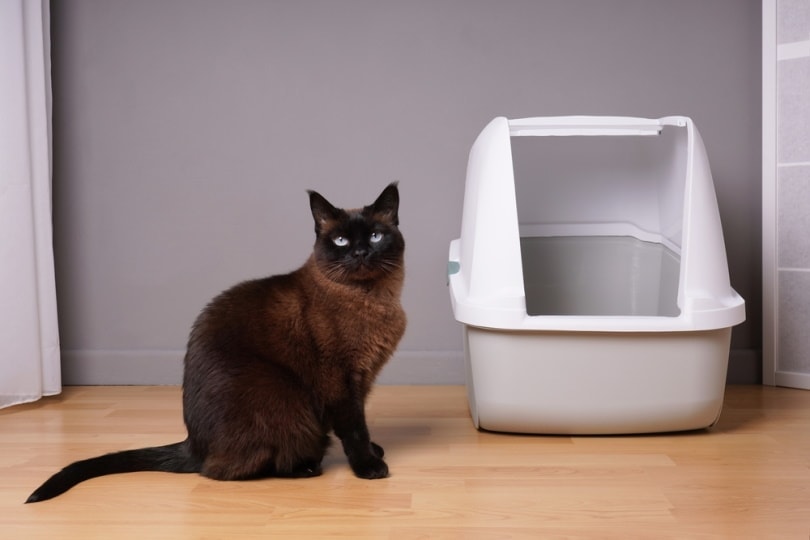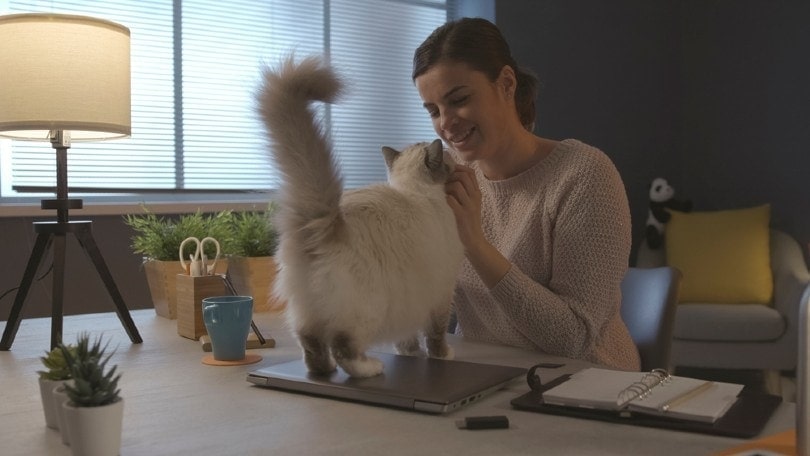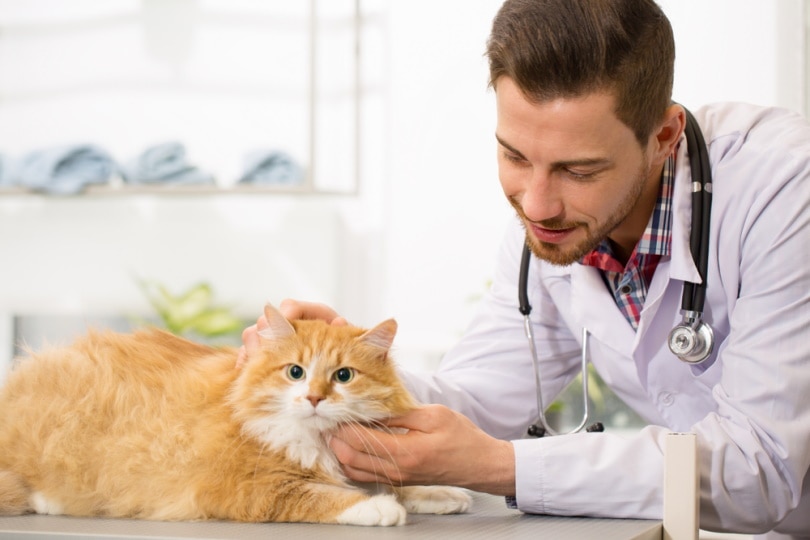Cat Peeing on Dog Bed: 5 Potential Reasons & Solutions

Updated on

Raising a cat and a dog together is both fun and challenging. If you own both a cat and a dog and suddenly discover that your cat is peeing on your dog’s bed, you may be very surprised. Cat urine isn’t pleasant to smell, and no dog wants to sleep in a bed that’s been saturated with cat pee.
Before you can solve the problem of a cat peeing on your dog’s bed, you need to get to the reason why they’re doing that. There are a few potential reasons for this behavior, which we’ll cover below, along with the appropriate solution for each. Sit back, relax, and continue reading so you can solve the problem once and for all!
The 5 Reasons Cats Pee on Dog Beds
1. Your Cat Doesn’t Like Their Litter Box or Where It’s Located
Your cat may be peeing on the dog bed because they don’t like their litter box. Maybe the litter box has a cover that traps odors or restricts their movement so they can’t get in a comfortable position to do their business.
Take a good look at the litter box to see if something looks “off.” Maybe you’ll discover that you need a bigger litter box that gives your cat more room to pee and poop.
While you’re assessing your cat’s litter box, consider where it’s located. Cats like to pee and poop in solitude so it’s always best to place the litter box away from high traffic areas. Maybe your dog’s bed is in a nice, secluded location your cat prefers over where their litter box is placed.
How to Remedy the Problem
If you suspect that your cat doesn’t like their litter box, the obvious solution is to buy a new one. Litter boxes come in a wide variety of styles and sizes so pick one that best meets your cat’s needs. For instance, if your cat is on the big side, get a large litter box that will accommodate their hefty size.
If the litter box is placed in a high traffic area, move it to another location. Pick a spot in your home that is quiet and away from the hustle and bustle of your household. Pay attention to your cat to see if they start heading toward their newly-located litter box more often than they are going for your dog’s bed. If so, great! The problem of your cat peeing on the dog bed is solved!

2. Your Cat Doesn’t Like the Litter
As a consumer who buys pet supplies, you probably have your preferences when it comes to cat litter. Well, guess what! Your cat may be the same way! Many cats are very picky about the litter in their litter boxes.
It’s common for cats not to like hard cat litter because it can be painful to step into hard litter. This is especially true with declawed cats. Some cats don’t like coarse litter stuck between their toes. Some cats might not like heavily-scented litters, either.
How to Remedy the Behavior
It can be tricky to know if your cat is objecting to a particular type of litter. A good way to figure it out is by conducting a little experiment. Put out an additional litter box with a different type of litter. For example, if you’re using traditional clay litter, then put out a box filled with soft, scoopable litter. Or, if you’ve been using a scented litter, put out a box filled with unscented litter. Then watch your cat to see what box he heads for when it’s time to pee or poop!
3. Your Cat Feels Anxious or Stressed
Stress and anxiety can cause litter box problems. Your cat may become anxious or stressed by events you may not view as traumatic. A sudden change may be all it takes to upset your cat, like moving, adding new animals to the family, or bringing home a new baby.
Think about your home life for a few minutes. Has something changed that may be upsetting your cat? Maybe you recently welcomed a new baby or got another pet that’s getting lots of love and attention.
How to Remedy the Behavior
If something has changed in your life, like adding a new pet or family member, give your cat time to settle down and accept the change. It’s a good idea to give your cat some extra attention and love for a few days. As you shower your cat with attention, watch where they go to relieve themself. Hopefully, they’ll head for their litter box instead of your dog’s bed to pee and poop!

4. Your Cat Wants Two Litter Boxes
Many cats prefer having one litter box to poop in and another to use for urination. If your cat is just peeing on the dog bed and not pooping on it, this could be the reason. Remember that cats like to use clean litter boxes. If you’re not especially quick at scoping out clumps of poop and pee, your cat may protest by finding another place to do their business.
How to Remedy the Behavior
The obvious solution to a lack of litter boxes is to add one into the mix. But don’t place the new box close to the existing box. If possible, place the new box on another floor in your house, like upstairs or the basement. This way, your cat is more likely to use one box for pooping and the other for peeing.
While the idea of having two litter boxes may make you groan because you’ll have more scooping to do, it may be worth it to get a second box. Think of your poor pooch who is finding cat pee on their dog bed! If things work out as planned, both your cat and dog will appreciate the new arrangement, even though you’ll have more scooping to do!
5. Your Cat Has a Health Problem
Whenever a cat displays unusual behavior, there could be a health-related reason behind it. Peeing on a dog bed is no exception. Cats with health problems often avoid using their litter boxes because they don’t feel good. According to the American Animal Hospital Association or AAHA, some health issues that can cause a cat to pee on a dog bed may include:
- Diabetes
- Arthritis
- Urinary tract infection (UTI)
- Kidney disease
- Cancer
- Bladder stones
- Constipation
- Hyperthyroidism
- Cystitis
How to Remedy the Behavior
It’s always wise to contact your vet if your cat seems sick or exhibits unusual behavior. If it’s been a while since your cat has seen your veterinarian, maybe it’s time for a health check! When you contact your vet’s office, tell them that your cat isn’t using their litter box as usual. Mention other changes you’ve noticed in your pet, as anything unusual may give your vet a clue regarding your pet’s health.
Your vet will probably tell you to bring your cat in for a few tests. If you have pet insurance, be sure to check with the company you use to see if testing is covered. If your vet discovers a health issue, a treatment plan will be developed to remedy the problem so your cat can resume using their litter box and not your dog’s bed.

Conclusion
It’s easy to train a cat to use a litter box, which is one reason why cats make great pets. If your cat is suddenly peeing on your dog’s bed, there’s a reason for this odd and kind of repulsive behavior. Once you get to the bottom of why they are avoiding their litter box, you can find a good solution that works!
Don’t hesitate to contact your veterinarian if you suspect a health problem is behind your cat’s behavior, as it’s always best to be safe rather than sorry. Remember that your cat depends on you to keep them safe, happy, and healthy.
Featured Image Credit to: Iva Vagnerova, Shutterstock












